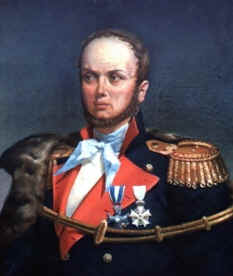
Born: March 14, 1794, Tarnów, Kingdom of Galicia and Lodomeria of the Austrian partition of Poland (presently Poland)
Died: December 10, 1850, Aleppo, Ottoman Empire (now Syria)
Early life. Father, Andrzej Bem, an attorney and professor of mathematics. Mother -Agnieszka Goluchowska. After the creation of the tiny Duchy of Warsaw from the territories captured by Napoleon, he moved with his parents to Kraków, where after finishing military school (where he distinguished himself in mathematics) he joined in 1809 the ducal forces as a fifteen-year-old cadet. Bem joined a Polish artillery regiment as a sub-lieutenant and then lieutenant in the French service, took part in the Napoleon’s invasion of Russia (1812), and subsequently distinguished himself in the defense of Gdansk (1813), winning the Knight's Cross of the Legion d'honneur.
Career. After the Congress of Vienna in 1815, the Duchy of Warsaw was transformed into the constitutional Kingdom of Poland, a dependent territory of the Russian Empire, and Bem became a captain in the Kingdom’s army and a teacher at a military college. There he carried out research on a newly designed rocket-like missile. Bem became involved in a political conspiracy to restore Poland to full independence, but, when his membership in a secret patriotic organization was discovered, he was demoted and sentenced (in 1822) to one year in prison. Although the sentence was suspended, Bem resigned his commission and moved to Galicia (Austrian partition of Poland). In Galicia he researched steam engines and their application, and again published his results. Bem lived in Lwow (presently Lviv, Ukraine) and Brody until 1830. When the November Uprising broke out on November 29, 1830, Bem immediately joined the Polish insurgents. He arrived in Warsaw, was given a major's commission and the command of the 4th Light Cavalry Battalion, which he led during the Battles of Iganie and Ostrołęka. During the Battle of Ostrołęka, Bem's forces bravely charged the Russian opponents. Although the Polish army suffered a serious defeat with a loss of 6,000 men, Bem's actions prevented the destruction of the entire army. For his valor on the battlefield, Bem was awarded the Virtuti Militari Golden Cross and promoted to the rank of Brigadier General. He was steadfastly against capitulation until the very end of the Uprising, during the desperate defense of Warsaw against Prince Pashkievich . Bem then escaped to Paris, where he supported himself by teaching mathematics. In France, he was connected with Hotel Lambert camp and supported Prince Adam Jerzy Czartoryski. In 1833 he went to Portugal to assist the liberal Dom Pedro against the reactionary Dom Miguel, but abandoned the idea when it was found that a Polish legion could not be formed. In Portugal, he was the target of an assassination attempt, carried out by Lieutenant Pasierbski probably a Russian agent.
A wider field for his activity presented itself in 1848 .First he attempted to hold revolutionary Vienna against the imperial troops of Alfred I, Prince of Windisch-Grätz, and, after the capitulation, hastened to Pressburg (today Bratislava, Slovakia) to offer his services to Lajos Kossuth, (in the Hungarians uprising against the Austrians) first defending himself, in a long speech, from the accusations of "treachery to the Polish cause" and "aristocratic tendencies" ˙— which the more fanatical section of the Polish émigré Radicals repeatedly brought against him. He was entrusted with the defense of Transylvania at the end of 1848, and in 1849, as General of the Székely troops, he performed miracles with his 8,000 strong army, notably at the bridge of Piski on February 9, where, after fighting all day, he drove back an immense force of pursuers. After relieving Transylvania he was sent to drive the Austrian General Anton Freiherr von Puchner out of the Banat region. Bem defeated him at Orşova, but the Russian invasion forced him to retreat to Transylvania. From July 12 to 22 he was fighting continually, but finally his army was annihilated by overwhelming numbers in the Battle of Segesvár (now Sighişoara, Romania. Yet he fought a fresh action at Nagycsür (now Sura Mare, Romania) and contrived to bring his fragmented army to the Battle of Temesvár (now Timişoara, Romania), to aid the hard-pressed General Henryk Dembiński. Bem was in command and was seriously wounded in the last pitched battle of the war. After the collapse of the Hungarian Uprising Bem crossed, together with Hungarian generals Kmetea and Stein, the Turkish border and converted to Islam to be able to join Sultan’s army and served as Governor of Aleppo under the name of Murad Paşa/Pasha. His remains were brought back to Poland in 1929 and laid to rest in a mausoleum in Tarnow (Poland).
Recognition. In 1897 Jan Styka dedicated to Bem one of his panoramic paintings showing the capture of Sybin by the Hungarian insurgents under Bem’s command. In 1911 Polish novelist Gasiorowski finished his novel “Bem.” The Hungarian Revolution of 1956 began on October 23 with a protest at the foot of the Bem Statue in Budapest. The poets Norwid and Petofi devoted to Bem some of their works. One of the Warsaw’s districts is named “Bemowo”.
Publications. Józef Bem -Notes sur les fusées incendiaires", 1819, Bavaria; Jozef Bem - Erfahrungen über die Congrevischen Raketen czyli (Doswiadczenia z rakietami kongrewskimi) 1820; Jozef Bem - O machinach parowych, Piller Publishers, Lwow, 1829; Jozef Bem - Wegrzy i Polacy w dzisiejszym stanie Europy; Jozef Bem - O powstaniu narodowym; Jozef Bem - "La Pologne dans ses anciennes limites et l'empire des Russies" 1836
Sources:
Wikipedia
Text is available under the Creative Commons Attribution-ShareAlike License.
Wikipedia (Polish version)
Return to home page:
Prominent Poles